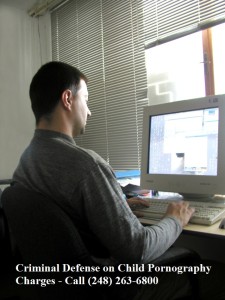Criminal Defense of Child Pornography Charges
The defense of child pornography charges, or CSAM, is a challenging area of the law, and prosecutors are specially trained and highly aggressive. The best and most effective defense lawyers are aggressive, zealous, and fearless.

What does “Possession” of Child Pornography mean?
The Michigan Supreme Court has determined that possession in the context of child sexually explicit material and possession of child pornography cases includes both actual and constructive possession. This makes it extremely difficult for a person accused of possession of child pornography to defend themselves.
In the case decided by the Michigan Supreme Court, the defendants were identified after federal officials raided a company in Florida that sold child pornography on the Internet. The defendants argued that passive viewing did not constitute possession of child pornography. The court disagreed.
The Michigan Supreme Court held that possession of child pornography (CSAM) occurs in cases when a person has actual control or knowingly has the power and intention to exercise control over a depiction of child sexually abusive material, including an electronic or computer image.
The court determined that viewing child pornography on a computer was constructive possession because the viewer can exercise dominion and control over the images by such things as saving, printing, and emailing them, to name a few. Three justices dissented from the majority opinion. The dissenters felt that it was a huge leap to assume that whenever someone intentionally views an image on a website, they intend to save, print, or email it. If an image was inadvertently displayed without knowledge or intent, the accused person is not guilty of possession of child pornography; however, the government will be hard-pressed to concede a lack of awareness.
How Defense Attorneys Help Clients Avoid Prison
Defending a client charged with possession of child pornography is a challenging and sensitive task, requiring a delicate balance between legal strategy and ethical considerations. Here are some strategies a defense attorney might employ to persuade a judge to focus on rehabilitation rather than prison time:
- Highlighting Lack of Criminal History: If the client has no prior criminal history, especially no history of sexual offenses, top child pornography defense attorneys can emphasize this to suggest that the client is less likely to re-offend and could be a good candidate for rehabilitation.
- Presenting Psychological Evaluations: The defense can present evaluations from psychologists or psychiatrists indicating that the client has a treatable condition and could benefit more from therapy and rehabilitation than incarceration. If a judge believes a defendant is getting help, they are much more likely to consider a non-custodial sentence.
- Demonstrating Remorse and Willingness to Change: Showing that the client acknowledges the wrongdoing, expresses genuine remorse, and is willing to engage in rehabilitative programs can be persuasive. This might include voluntary participation in therapy or support groups even before the trial. Judges and prosecutors deem defendants who fail to take responsibility more dangerous and likely to re-offend.
- Providing Character Testimonies: Character references from people who know the client well and can vouch for their general character and potential for rehabilitation might help. A skilled, experienced defense lawyer will help their client obtain meaningful, credible letters for plea negotiations and sentencing.
- Outlining the Risks of Incarceration: The defense can argue that incarceration might expose the client to worse criminal influences or exacerbate their psychological issues, making rehabilitation more difficult upon release. An argument that prison will make the defendant more likely to re-offend is most effective when made on behalf of a youthful offender or someone with a minimal criminal history.
- Proposing Specific Rehabilitation Programs: The attorney can propose specific, structured rehabilitation programs that are available and explain how these would benefit the client and society more than imprisonment. The Defense Team with LEWIS & DICKSTEIN, P.L.L.C. works with top experts who evaluate our clients and recommend treatment to help them rehabilitate and assist with plea negotiations and sentencing.
- Addressing Public Safety Concerns: The defense must also address concerns about public safety. This might include proposing measures like supervised internet access, restricted travel, mental health therapy, support group participation, or regular check-ins with a probation officer.
- Legal Precedents and Sentencing Guidelines: The attorney can reference legal precedents where similar cases led to rehabilitation-focused sentences. Additionally, they can argue how the sentencing guidelines support or allow for a rehabilitative approach in this particular case.
- Mitigating Circumstances: An influential defense attorney will highlight any mitigating circumstances leading to the offense, such as mental health issues, a history of abuse or neglect, extreme stress or anxiety, family conflict, lack of guidance as a child, etc.
It’s important to note that every case is unique, and the effectiveness of these strategies will depend on the specific circumstances of the case, the applicable law, the judge’s disposition, and the severity of the charges. Additionally, the attorney must navigate these strategies while maintaining ethical standards, respecting the seriousness of the charges, and doing whatever is necessary to protect and defend the client.
If someone is accused but not yet charged, should they retain a defense lawyer on a precharge basis?
On a precharge basis, a defense attorney plays a crucial role in guiding and protecting someone accused of possession of child pornography in Michigan. Before formal charges are filed, the attorney can provide essential legal advice and take proactive steps to influence the direction of the case. The attorney can engage in discussions with law enforcement and prosecutors to understand the nature and extent of the evidence against their client and negotiate potential outcomes. This phase allows the attorney to possibly prevent charges from being filed or to work towards lesser charges, depending on the evidence and circumstances.
The attorney can also advise the accused on their rights and the legal processes, ensuring they do not inadvertently incriminate themselves during investigations. During this precharge stage, the defense attorney might recommend actions demonstrating the accused’s willingness to address the underlying issues, such as voluntarily beginning therapy or counseling, which can sometimes positively influence the prosecutor’s decisions and any impending sentence. Also, the lawyer can arrange for the client’s voluntary surrender in court, thereby preventing their arrest and detention pending an arraignment.
An experienced, successful pre-charge defense attorney will begin preparing for potential defenses, gathering mitigating evidence, and building a strategy in case charges are eventually filed. This preparation might include collecting character references, seeking expert opinions, and exploring legal precedents relevant to the case.

Frequently Asked About Child Pornography Charges (FAQs)
“What are the penalties for child pornography charges?” In Michigan, penalties for child pornography can be severe, including imprisonment, heavy fines, and mandatory registration as a sex offender. The exact penalty depends on the specific charges, such as possession, distribution, or production.
“How can a lawyer defend against child pornography charges?” Defense strategies may include challenging the legality of the search and seizure, the credibility of digital evidence, or the accused’s intent. In many cases, the defense strategy involves presenting mitigating information to persuade the judge and prosecutor to agree upon a sentence focusing on rehabilitation, instead of punishment. Each case is unique, and strategies depend on the specifics of the evidence and circumstances.
“What is the difference between state and federal child pornography charges?” Child pornography can be prosecuted under both Michigan and federal law. Federal charges usually carry harsher penalties and are often used in cases involving distribution across state lines or using federal communication systems. The attorneys with LEWIS & DICKSTEIN, P.L.L.C. have decades of experience helping clients facing these complex charges and an unparalleled track record of achieving extraordinary results.
“How do I find the best child pornography defense attorney near me?” Choosing a defense attorney who is experienced in handling child pornography cases and familiar with both state and federal laws is crucial. It’s best to look for attorneys with a track record of handling similar cases. If you call our office for a free consultation, we will take the time to talk with you, answer your questions, and work with you to develop a winning strategy. Every case is defensible!
“What are the defenses against accusations of possessing child pornography?” Common defenses include lack of intent, mistaken identity, accidental possession, entrapment, or challenging the age of the individuals depicted. The defense strategy would be based on a thorough analysis of the case.
“How does the law define child pornography?” Michigan law defines child pornography as any visual representation, including photos, videos, or digital images, of a minor engaged in sexual conduct. Understanding the nuances of the legal definition is vital for the defense.
“What should I do if falsely accused of child pornography?” It’s crucial not to make any statements to law enforcement before consulting an attorney if you are accused of possessing child pornography. The defense will focus on disproving the allegations and may involve digital forensics to challenge the evidence. It is best to retain a precharge defense attorney immediately upon finding out about an accusation. Never wait for charges because an experienced attorney might be able to proactively intervene, prevent or reduce charges, and negotiate for their client to voluntarily surrender instead of facing an arrest.
“Can charges of child pornography be reduced or dismissed?” Reducing or dismissing charges might be possible depending on the strength of the evidence, procedural errors, actual innocence, or constitutional violations during the investigation. Plea negotiations might also be an option.
“What is the role of digital forensics in child pornography cases?” Digital forensics plays a crucial role in child pornography cases, as it involves analyzing digital evidence like computer files and internet history. A skilled defense attorney might use expert witnesses in digital forensics to challenge the prosecution’s evidence.
“How long can you go to jail for child pornography offenses?” Potential prison time for child pornography offenses in federal court and Michigan varies based on the nature of the crime, prior criminal history, and other factors. Sentences can range from several years to life in prison for the most severe cases. Often, our attorneys can negotiate with judges and prosecutors to reduce charges and the potential sentence, thereby ensuring our clients get help rather than overly harsh punishment.
Seeking Help
Seeking help for an addiction to child pornography is a critical step towards recovery and preventing potential legal issues or harm to others. It’s essential to approach this issue with sensitivity and seriousness. Here are some resources and steps one can take:
- Mental Health Professionals: Consulting a licensed therapist, particularly one specializing in sexual addictions or problematic sexual behaviors, is crucial. They can provide confidential, professional help and tailor a treatment plan to the individual’s needs.
- Addiction Recovery Programs: There are specific programs and support groups designed for those struggling with sexual addictions, including child pornography. These programs often use a 12-step approach similar to that used for substance abuse disorders.
- Psychiatric Help: In some cases, underlying psychiatric conditions may contribute to addictive behaviors. A psychiatrist can evaluate these issues and provide appropriate medication or treatment if necessary.
- Online Resources and Helplines: There are various online resources and helplines that offer advice and support for those struggling with pornography addiction. While these are not substitutes for professional therapy, they can be a starting point for seeking help.
- Legal Advice: If there are legal concerns, such as potential criminal liability, it’s important to consult a lawyer who specializes in this area of law. They can provide guidance on legal rights and implications. It is vital that someone retains a defense attorney at the first hint of a possession of child pornography allegation.
- Family Support: Engaging family members in the recovery process can be beneficial. Family therapy might be recommended to address any underlying issues and to provide a support system. It might be challenging to admit to their family that there is a child pornography issue or addiction; however, family support can be essential in someone’s recovery and rehabilitation.
- Self-Help and Educational Resources: Educating oneself about the nature of addiction and recovery strategies can be empowering. There are books, workshops, and online courses that focus on overcoming sexual addictions.
- Confidential Support Groups: Joining a support group, such as Sex Addicts Anonymous (SAA), where members share similar struggles can provide a sense of community and understanding. These groups often emphasize confidentiality and provide a non-judgmental space for sharing and healing.
- Religious or Spiritual Guidance: For some, seeking help from a religious leader or engaging in spiritual practices can be an important part of their recovery journey.
- Avoiding Triggers: Part of recovery will involve learning to identify and avoid triggers that lead to addictive behavior, as well as developing healthy coping strategies. Avoiding unsupervised contact with minors while someone undergoes treatment is essential.
It’s important to remember that seeking help for this type of addiction is a sign of strength, not weakness. Overcoming such a challenge requires courage, commitment, and the willingness to engage with professional support. The road to recovery can be difficult, but with the right help and resources, it is possible. An experienced child pornography defense attorney can help you find the help you need.

Michigan Criminal Defense Attorney Experienced in Child Pornography Cases
If you, or a loved one, is faced with a criminal offense or child pornography charges, it is important that you have an attorney who is experienced in defending people charged with crimes. The attorneys at LEWIS & DICKSTEIN, P.L.L.C. only practice in the area of possession of child pornography criminal defense. They have decades of experience successfully representing clients charged in state and federal courts all over Michigan. Call us to discuss your situation. Our attorneys and staff treat everyone with dignity and respect and without judgment. We will find a way to help you!
Call us today at (248) 263-6800 for a free consultation or complete an online Request for Assistance Form. We will contact you promptly and find a way to help you.












